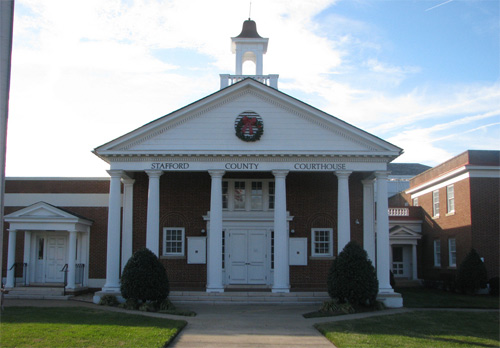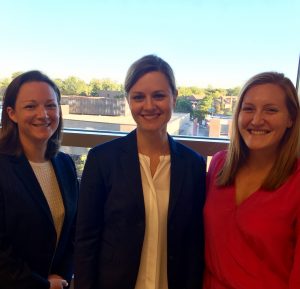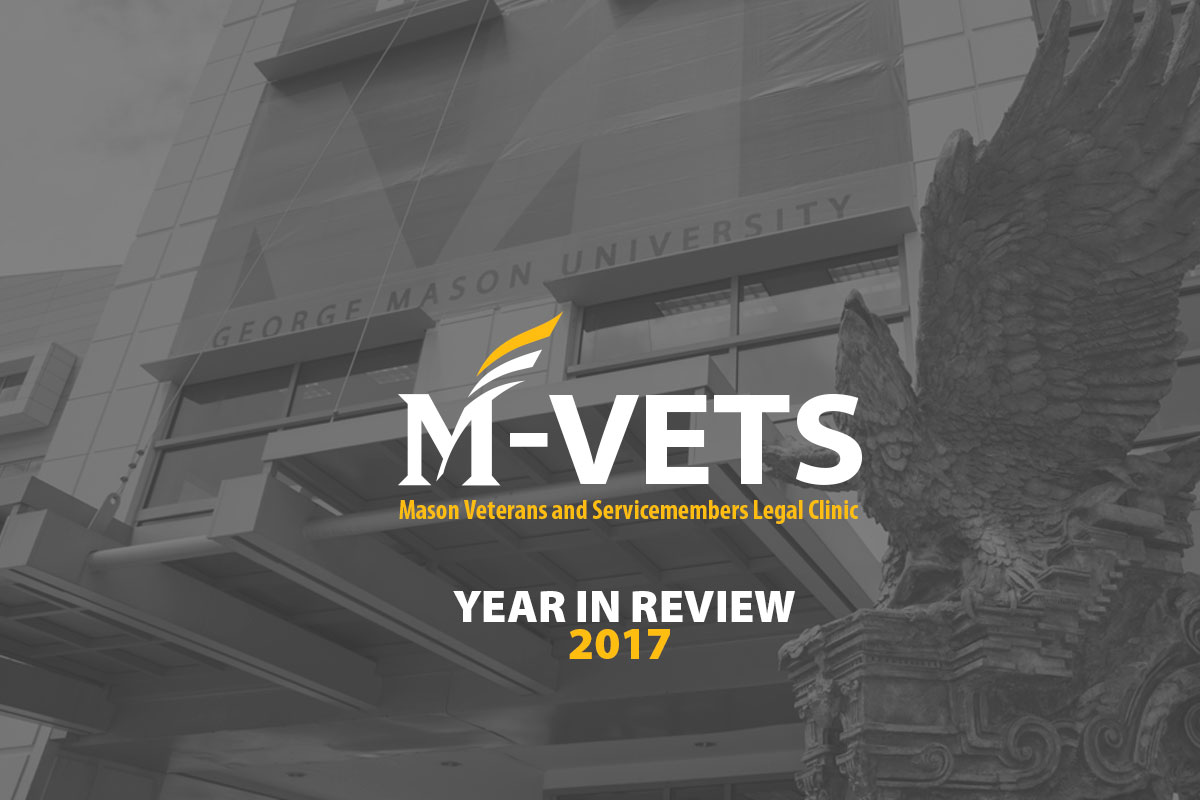Milestones
The Mason Veterans and Servicemembers Legal Clinic (“M-VETS”) is proud to recap its milestones and accomplishments during the past year. Through the hard work of our Student Advisors, M-VETS provided nearly 2,000 hours of pro bono legal services to its clients, equating to a private market value of over $400,000. M-VETS Student Advisors completed nearly 5,000 total hours in 2017, both clinic hours and client hours—a 1,600-hour increase from 2016.
In doing so, the clinic finalized several litigation matters, including the longest running case in the clinic dating back to 2010, screened a record 139 intake applications and took on 22 new clients in addition to its active docket from the previous year.
In its continuing efforts to develop strategic partnerships, M-VETS formally teamed with Legal Services of Northern Virginia to assist with its Veterans Law Project and joined the National Law School Veterans Clinic Consortium, a collaborative of the nation’s law school legal clinics dedicated to addressing the unique legal needs of U.S. military veterans on a pro bono basis. M-VETS also welcomed a new addition to its clinic staff, Jessica O’Connell, as the clinic’s first adjunct professor. A Scalia Law graduate, Ms. O’Connell currently works at the Board of Veterans Appeals and provides instruction on military/VA subject matters.
Thank you to all Students and Staff for a productive 2017!
M-VETS Prevails at Trial in Landlord-Tenant Dispute

M-VETS won a favorable verdict for a client, a Coast Guard and Marine Corps Veteran, in Stafford County Circuit Court in November 2017. The client sought and recovered his security deposit from his former landlord, who withheld the entire deposit, in part, to pay for damages the tenant reported during his tenancy. The Circuit Court Judge found that the damages were the responsibility of the Landlord pursuant to the terms of the Lease and that the Landlord’s failure to conduct a proper move-out inspection warranted the return of the entire security deposit to the tenant.
The verdict was achieved after the Landlord appealed the General District Court’s decision, where the lower court also held in favor of the M-VETS client in the spring of 2017. An appeal to Circuit Court constitutes a de novo review where a new trial is conducted without deferring to the lower court’s rulings on law or fact.
The client expressed his gratitude to M-VETS: “From the start, [M-VETS] made me feel like I had an ally . . . [their personnel’s] friendly manner and obvious expertise gave me hope that I could put the facts in front of a judge on an equal footing with any company or person with more resources than me,” the client said.
M-VETS Finalizes Seven-Year Litigation to Assist Servicemember in Securing Return of Security Deposit After Battling Through Federal and State Court

M-VETS closed one of its oldest and most unique cases in December 2017, securing ordinary relief through unorthodox means. M-VETS represented an active duty Servicemember and his wife in seeking the return of their security in 2010. Seven years later, the family recovered the entirety of the deposit, plus seven years of interest.
In a bizarre case that began in General District Court and ended in the Historic Fairfax County Courthouse, original judgment was entered in favor of the Servicemember but was appealed by the Landlord to the Circuit Court where M-VETS prevailed on Summary Judgment. The Landlord subsequently filed an appeal to the Virginia Court of Appeals—though unbeknownst to M-VETS or its clients, the landlord had also filed bankruptcy during the pendency of both appeals. The bankruptcy triggered the automatic stay with respect to all litigation at the state court level.
Because the Servicemember was not listed as a creditor in the Landlord’s bankruptcy, M-VETS filed an Adversary Proceeding in the U.S. District Court for the Eastern District of Virginia to lift the stay and have the debt deemed non-dischargeable. M-VETS obtained a final order from the bankruptcy court in the fall of 2016, which ordered the relief sought to move forward at the state court level.
With the automatic stay lifted, the Virginia Court of Appeals, which lacked subject matter jurisdiction, transferred the Landlord’s appeal to the Supreme Court of Virginia where the Landlord sought to amend her notice of appeal and obtain an extension of time to file her petition for appeal. M-VETS drafted and filed an opposition brief to the Landlord’s motion and prevailed in having both motions denied.
In May 2017, the Supreme Court of Virginia issued a final order finding no reversible error and denying the petition for appeal. Shortly thereafter, M-VETS filed a motion in the Circuit Court for the release of the civil appeal bond. Although the motion was granted and appeal bond released, the Servicemember was still owed seven years of interest on the judgment. To collect, M-VETS filed a wage garnishment in the Circuit Court, which came to a final resolution with the interest amount paid in full to the Servicemember in December of 2017 concluding seven years of litigation.
M-VETS Joins the NLSVCC

In its effort to form strategic partnerships to further the M-VETS mission, the clinic joined law school veterans clinics around the country by becoming a member of the National Law School Veterans Clinic Consortium (NLSVCC). The NLSVCC is a group of the nation’s law school legal clinics dedicated to addressing the unique needs of the military community by providing pro bono representation in various legal matters.
The mission of the NLSVCC is to gain support and advance common interests with the U.S. Department of Veterans Affairs, Congress, and state and local veterans service organizations, court systems, educators and all other entities for the benefit of veterans throughout the county.
M-VETS staff attended the NLSVCC’s first annual conference held in early 2018 in Washington, D.C. The conference included a panel discussion with Judges from the Court of Appeals for Veterans Claims and remarks by VA General Counsel, James Byrne. Keynote speaker then-VA Secretary David Shulkin announced that the NLSVCC had officially been granted recognition as the nation’s 93rd Veterans Service Organization (VSO).
M-VETS Finalizes Step-Parent Adoptions for Two Families of Active Duty Servicemembers

M-VETS successfully assisted two military families in filing and finalizing stepparent adoptions in the fall of 2017. The first family of an active duty Marine sought the clinic’s assistance in finalizing the adoption of the Marine’s four-year-old stepdaughter. The Servicemember, who met his wife while stationed overseas in Europe, requested assistance from M-VETS in filing the petition for adoption. With the hard work of M-VETS Student Advisors who drafted all pleadings, affidavits, and orders, the Servicemember and his family received the Final Order of Adoption in August 2017.
“Their assistance has made our life much easier and the process was headache free. Their assistance gave us the peace of mind we needed to close that chapter in our lives,” said the family.
“M-VETS has given [us] what we always wanted: to officially be a family. We will forever be grateful and never forget the hard work that has been done by them. A foreign adoption that ended up successfully and with tears of joy,” said one family member.
The second client was an active duty servicemember serving in the U.S. Air Force. He contacted M-VETS seeking to adopt his seven-year-old stepson. M-VETS Student Advisors not only drafted affidavits and pleadings, but also obtained the consent of the birth father to efficiently finalize the adoption.
“We are so grateful to M-VETS for the adoption services, along with the extraordinary customer service provided to our family. The process was made simple and the path almost completely navigated by their highly qualified personnel,” said the family.
Three Student Advisors worked tirelessly on these adoption matters through three semesters.
“Our Student Advisors were incredibly diligent and meticulous in navigating these stepparent adoptions to successful resolutions,” M-VETS Managing Attorney Leigh Winstead said. “It was not only a great learning experience for our students, but an incredibly rewarding experience to be able to bring a family together in a legal sense.”
Student Standouts
M-VETS Student Advisors Awarded Public Service and Outstanding Student Awards
M-VETS Student Advisor Jamesian D. Emmanuel, was awarded the Antonin Scalia Law School Emerging Leader in Public Service Award in 2017. In addition to serving two terms in M-VETS, Mr. Emmanuel was employed as a Police Officer, presided as the President of the Military Law Society, and volunteered as an intern for the Department of Justice. After graduation Mr. Emmanuel accepted an active duty commission in the JAG Corp as an officer in the U.S. Air Force.
M-VETS Student Advisor C.J. Nee was awarded the Clinical Legal Education Association Outstanding Student Award for his demonstrated excellence in the clinical and classroom components of M-VETS. The annual award honors one law student at each law school who has excelled in a clinical course.
Jamesian and C.J., Bravo Zulu!
PTSD and the Link to Obesity
Student Blog Post: Bonnie Kelly
Complete Blog Post with citations can be found at: MVET Blogs
Seventy percent of American adults are overweight or obese. Within the military about 7.8% of personnel are now considered overweight up from 1.6% in 2001. Being overweight is unhealthy for anyone, but it causes specific problems for service members, including the possibility of administrative separation for weight control failure. There may be a number of reasons why military personnel are becoming overweight, just like reasons among the civilian population vary. However, service members and veterans may be more likely to face an additional cause of weight gain than civilians: PTSD.
Recent studies show a link between PTSD and weight gain. Because more than half of Iraq and Afghanistan veterans enrolled in VA healthcare have received mental health diagnoses, with PTSD being the most common, the link is extremely important to investigate. The military has recognized this link as evidenced by the Millennium Cohort Study, which began in 2001 and involves more than 77,000 military service members representing all branches of service. The goal of the study is to “follow the participants through and beyond their service, for up to 21 years” to evaluate the longitudinal sequence of PTSD, new onset binge disordered eating, and subsequent weight gain.” Thus far the study has shown “that PTSD was both directly and indirectly (through the use of compensatory behaviors) associated with weight change in a nationally representative sample of male and female service members.” PTSD causes a chronic stress reaction in response to trauma and is a condition identified as a possible risk factor for obesity.
For women, the link between PTSD and weight gain is especially troubling. In the civilian population, one in nine women will experience PTSD in their life, about twice the rate of men. Several studies have shown this link for women, once more confirming PTSD as more than a mental health issue. A longitudinal study of female nurses begun in 1989 with follow up through 2005 showed that even after controlling for depression, also a factor in weight gain, PTSD symptoms were associated with faster weight gain and increased risk of obesity in women. Normal-weight women who developed PTSD during the study had a 36% increased risk of becoming overweight or obese compared to women who experienced trauma but had no PTSD symptoms. For women who developed PTSD during the study, the study pinpointed when Body Mass Index (BMI) trajectories changed, and this change corresponded with the trauma event.
The way in which PTSD causes weight gain isn’t fully understood; however, scientists point to the over-production of stress hormones as a potential factor. Cortisol, known as the stress hormone, is released in higher amounts during periods of physical or psychological stress. “Cortisol stimulates fat and carbohydrate metabolism for fast energy, and stimulates insulin release and maintenance of blood sugar levels. The end result of these actions can be an increase in appetite and can cause cravings for sweet, high-fat, and salty foods.”
So, what does this mean for service members? “High rates of excessive weight and body fat have implications for national security if our Armed Forces are unable to recruit and maintain fitness throughout military service. In addition, the Department of Defense, as the largest public healthcare provider in the United States, must address challenges that obesity poses to the military healthcare system, which not only provides care to service members but also to beneficiaries and retirees.” The rate of obesity has implications for long-term healthcare for members but also for healthcare costs. Individuals with obesity are significantly more likely to have hypertension, diabetes, and sleep apnea than individuals at normal weight.
These health issues also mean it is vitally important to correctly diagnose and treat PTSD, an underlying cause of weight gain. For service members and veterans who have symptoms of PTSD it is important to seek help. While earlier treatment is better, it is never too late to receive PTSD treatment. Studies now show that treatment can be imperative for both mental and physical health. Talk to your family physician, a therapist or local VA facility. For clinicians working with service members and veterans diagnosed with PTSD this requires “integrated efforts from primary care and mental health to treat underlying mental health causes and assist with engagement in weight loss programs.”
Even though a majority of the population is now obese or overweight, there remains a stigma surrounding weight gain, often attributed to lifestyle or laziness. For service members or veterans who struggle to maintain a healthy weight, it is important to know if PTSD may be a contributor so that weight can be managed more effectively and prevent other health conditions related to obesity. There is no stigma to having suffered a trauma.
Faculty and Staff
New Additions
M-VETS welcomed a new adjunct professor to its staff in 2017. Jessica O’Connell, a Scalia Law Alumna, is currently an Associate Counsel at the Board of Veterans’ Appeals in Washington, D.C. During her law school career, Ms. O’Connell served as a Student Advisor in the M-VETS clinic, where she assisted in the successful appeal of a claim at the Court of Appeals for Veterans Claims.
Ms. O’Connell began supervising clinic cases in the Spring 2018 semester and focuses on teaching material related to VA benefits appeals. She is licensed to practice law in Virginia and is a member of the Court of Appeals for Veterans Claims Bar Association.
